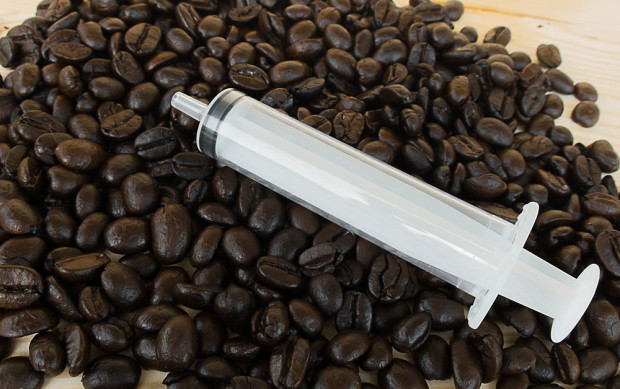


Caffeine is probably the most common nutrition supplement used. I mean, how many of us absolutely must have that morning pick-me-up? A survey conducted by the Department of Nutritional Sciences at Pennsylvania State University found that 85 percent of Americans consume at least one caffeinated beverage a day. There’s nothing wrong with caffeine, and a whole lot that is right, but there is more to this popular drug (yes, it’s technically a drug) than you may know. When using it as a sports supplement, there are a few rules to follow. So here are some dos and don’ts when caffeine is a part of your routine.
DO: When using caffeine to increase performance, it’s best ingested 60 minutes prior to exercise. This includes strength and power athletes, in addition to endurance athletes. A dose of three to six milligrams per kilogram of bodyweight is ideal. So how much is that exactly? Well, the average cup of coffee has about 200 milligrams of caffeine in it. And let’s say you weigh about 220 pounds (100 kilograms). Therefore, you’re looking at consuming anywhere between 300 to 600 milligrams of caffeine prior to exercise, or 1.5 to three cups of coffee. That may be hard to take in prior to exercise, so this is where caffeine pills or a pre-workout formula can come in handy.
DON’T: Avoid over-consuming it! Unfortunately, too much caffeine will work against you. Yes, it’s true that the more you take, the greater the ergogenic effect. But, unfortunately, as the doses go up, so does your risk of developing side effects such as anxiety, restlessness, and headaches, which all may impair performance. Also, because it impacts the central nervous system, it could potentially impact your sleep. And when beast mode is on, sleep is vital. Besides, going above six milligrams per kilogram of caffeine per day does not always result in improved performance. So in this instance, less is more.
DO: Include caffeine in your plan when cutting calories. Everyone knows that it increases your metabolism, so why not use it to your advantage? Studies have shown anywhere between a six percent and 16 percent increase in metabolic rate, depending on how much caffeine you consume. Also, your metabolism will remain elevated for a few hours after you consume it, giving you the ability to scorch a few extra calories. When used post-exercise, you could potentially reap the benefits of EPOC (excess post-exercise oxygen consumption, which elevates metabolism) and caffeine simultaneously, giving you that extra metabolic push.
DON’T: It’s believed that you shouldn’t ingest caffeine and creatine simultaneously. In fact, it’s been shown that caffeinated beverages actually negate any benefits you may get from creatine supplementation. Although some studies have proven otherwise, it may not be worth the risk of wasting money. Therefore, you may not want to add caffeine to that creatine/protein breakfast shake. Split them up and avoid any potential letdown.

DO: Make sure you cycle caffeine like you would any other ergogenic aid. Unfor-tunately, this is where that morning cup of joe may work against you. Our body is very clever and quickly adapts to outside influences. After a while, you become insensitive to caffeine, making it harder to benefit from its consumption. No one really knows the magic number of how long you need to wait before you cycle off it. But one thing is for sure, if you need to consume more and more caffeine just to get that same effect that you once did, it’s probably best to leave it alone for about a week so you can start to reap those benefits anew.
DON’T: Avoid the fancy versions of coffee that are supposed to be the better, stronger versions and offer greater results. These custom creations are often fortified with caffeine and other ingredients (such as green tea extract) that are said to improve weight loss, and mental and physical performance. Unfortunately, the research just doesn’t support those claims. Sure, there may be a boost in metabolic rate, but nothing you can’t get by simply drinking an extra cup of coffee. Save your money and leave the fancy stuff alone.
DO: If you are on a low-carb diet, you need to make friends with caffeine. We all know that when going low carb, post-exercise glycogen stores are going to be low, especially after high-intensity exercise. And if you’re doing two-a-days in the final stage of contest prep, this is something that can massively affect your performance in your next workout. But, luckily for you, caffeine may be your new superhero. Recently, it was shown that consuming caffeine and carbs improved glycogen synthesis rates significantly more than when consuming carbohydrates and protein together, or carbohydrates alone. In other words, caffeine helps partition the carbs you do eat into our muscles for fuel. It also has been shown to improve performance in subsequent bouts of high-intensity exercise.
DON’T: There is no need to rely on expensive energy drinks. Yes, we’ve heard that you can get wings from Red Bull, but at four dollars a can, is it really worth it? Also, most energy drinks are made up of “energy blends.” This typically includes caffeine, taurine, and an insane amount of B vitamins (which are not hard to get from food.) These “blends” are thought to aid in improving performance. However, negative side effects have been reported when consuming more than one serving per day long-term, including elevated blood pressure and resting heart rate. And who needs all those sweeteners, artificial colors, and preservatives?
DO: Add some variety to your caffeine consumption. It doesn’t always have to be coffee. Tea, especially black tea, is a good source of not only caffeine, but antioxidants. Cocoa is another good source of caffeine. And no, not your typical milk chocolate. It turns out, the darker the chocolate, the higher the caffeine content, and it’s a great source of antioxidants as well. But since it’s still high in saturated fat and sugar, unsweetened cocoa powder is what you should keep handy.
DON’T: If you’re new to training, go slowly using caffeine as an ergogenic aid. Because of its mechanism of action, caffeine can actually interfere with the transmission of painful stimuli to the brain. This has been shown to result in diminished pain percep-tion and reduced perceived exertion during exercise. While this may seem like a benefit, it could potentially be risky. Since it has hypo-algesic effects, you may not realize when you’re injured or how badly you may be injured. At the every least, you might end up with an epic case of delayed onset muscle sore-ness. Have a plan before you hit the gym and stick to it. Just because you feel invincible doesn’t mean that you are.
The Power of Coffe
Coffee is the most widely used source of caffeine, with about 70 percent of US caffeine intake coming from coffee. (You may even be drinking some as you read this.) It was once believed that coffee was a calcium parasite that could potentially lead to low bone mineral density and impaired muscle contractions. However, science has since put that to rest. Although it was suggested that caffeine enhanced calcium mobilization, it has been determined that a normal physiological dose does not necessarily use this mechanism of action. Score one for coffee.
Now you may have read about how coffee is turning out to be a superfood that should be included in every diet. Hold your horses while we sort through this. Yes, research has shown that coffee intake reduces your risk of numerous chronic diseases, including cancer. However, you have to consume an ungodly amount of coffee in order to reap the stated benefits. At minimum you need four cups of coffee (approximately 800 milligrams of caffeine) to get the most bang from your brew, with other studies indicating much more. Of course, everyone is different, so you may need more or less. But remember, when you start increasing caffeine consumption above six milligrams per kilogram of bodyweight, you’re increasing your risk of side effects that can end up being detrimental to performance.
by Jenevieve Roper, PhD (ABD), CSCS






















You must be logged in to post a comment Login